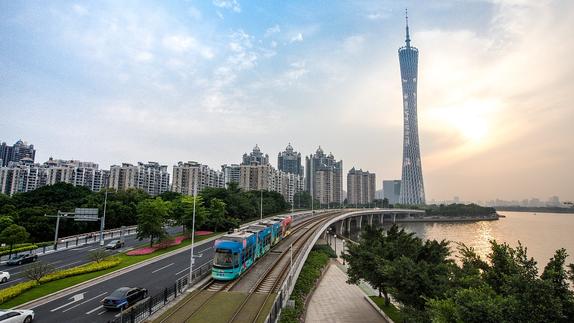 The Canton Tower stands in Guangzhou, Guangdong province, on April 17, 2018. (PHOTO / VCG)
The Canton Tower stands in Guangzhou, Guangdong province, on April 17, 2018. (PHOTO / VCG)
As the epidemic situation continues to ease in the mainland, workers in Guangdong province could see significantly higher pay raises than their Hong Kong counterparts in the coming year, a survey released on Wednesday showed.
The survey predicts a salary increase in 2021 for different levels of workers in the mainland cities of the Guangdong-Hong Kong-Macao Greater Bay Area of 5.2 to 5.6 percent, up from 4.4 to 5 percent this year.
The survey predicts a salary increase in 2021 for different levels of workers in the mainland cities of the Guangdong-Hong Kong-Macao Greater Bay Area of 5.2 to 5.6 percent, up from 4.4 to 5 percent this year
ALSO READ: Salary increases in 2020 expected to average only 1.4 percent after inflation
Meanwhile, the average pay raise in Hong Kong will drop to 1.7 to 1.8 percent next year, down from 2.2 to 2.4 percent this year, as COVID-19 casts a dark shadow on the city’s economic development.
The Bay Area salary and benefits survey was conducted from July to September by the Hong Kong Baptist University, the South China University of Technology, the Hong Kong People Management Association, and the Talent Development and Management Association of Guangdong in Hong Kong and Guangdong.
In the course of the survey, they interviewed 140,000 employees of different ranks from over 250 organizations in 10 Bay Area cities — all of them except Zhaoqing.
It interviewed 98 organizations in Hong Kong, 143 in Guangdong, and 12 in Macao, covering a wide range of business sectors in each region, including real estate, retail, engineering, high-tech development and manufacturing, information and technology, construction and social enterprises.
The result showed that from July 2019 to June this year, the average salary increase for all ranks of employees in the 10 cities surveyed was 0.9 to 6.8 percent, and will rise to 1.1 to 8.8 percent in 2021.
ALSO READ: CS urges youth to participate in Bay Area development
Putting different regions into comparison, Hong Kong’s average pay raise this year was about 2 percent lower than that of Guangdong, and the gap will widen to almost 4 percent, as mainland businesses continue to recover as the pandemic recedes.
The average starting monthly salary for university graduates in Hong Kong this year, including holders of a bachelor’s degree or higher, ranges from HK$13,846 (US$1,787) for those in sales, to HK$17,587 for those in engineering.
In Guangdong, the income ranges from 4,671 yuan (US$696) for those in sales, to 8,239 yuan for those in research and development.
Though the average salary is lower in Guangdong than that of Hong Kong, the overall cost of living is also lower in Guangdong, said Ray Leung, vice president of the Hong Kong People Management Association. This has posed opportunities for Hong Kong’s younger generation who want to give their careers a go across the border, he said.
ALSO READ: Competition in job market remains fierce
If the pandemic continues to haunt Hong Kong, the city’s unemployment rate could reach 8.5 percent and include salary freezes, he warned.
Hong Kong’s unemployment rate increased to 6.4 percent between July and September, the highest in close to 16 years. Experiencing a months-long local outbreak since July, the city is still struggling to pull itself out of the economic doldrums.
Leung said the period of the survey didn’t cover the entire epidemic, and the impact of COVID-19 on Hong Kong people’s income may become more significant next year.
Felix Yip, associate director of the Centre for Human Resources Strategy and Development of the School of Business at Hong Kong Baptist University, said that if Hong Kong people intend to work in Guangdong, they must redouble their efforts in their skills and networking to penetrate the domestic market.
READ MORE: All in the family in new frontiers


